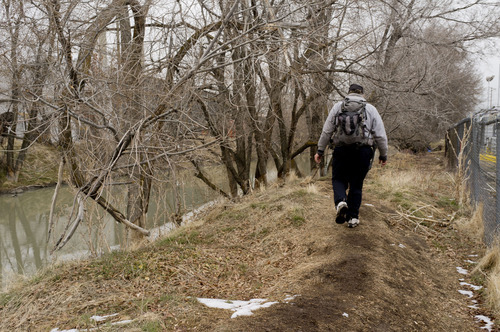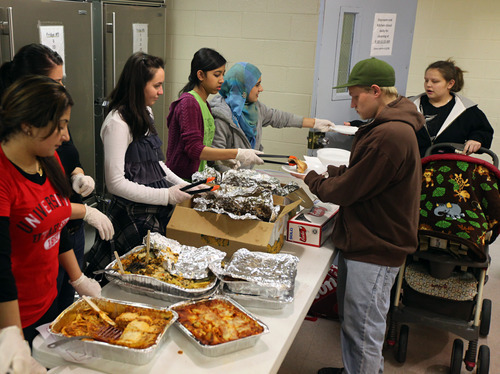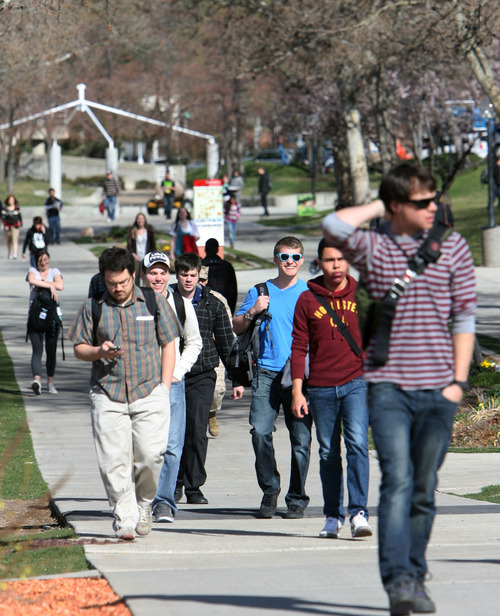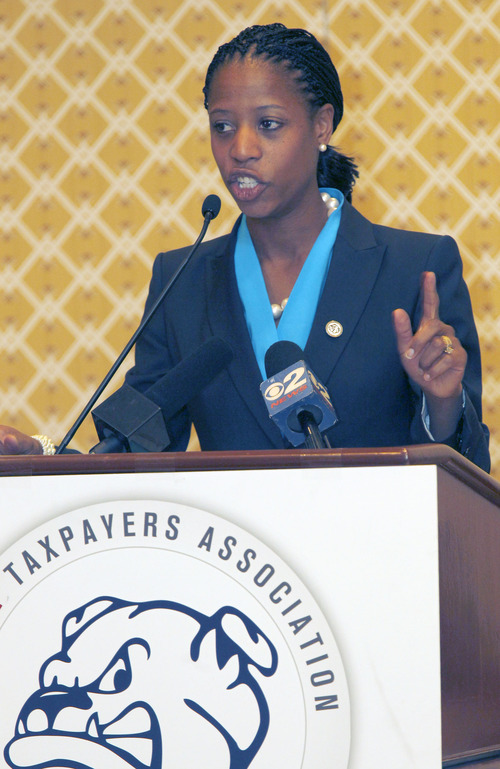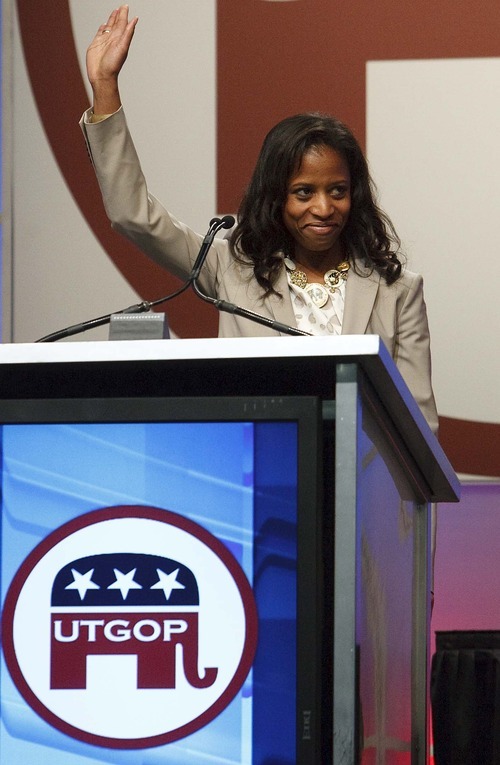This is an archived article that was published on sltrib.com in 2012, and information in the article may be outdated. It is provided only for personal research purposes and may not be reprinted.
Wherever she goes, Republican candidate Mia Love says her top priority as a member of Congress would be balancing the federal budget. Everything else is "remodeling the kitchen when the house is on fire."
To do that, she has offered a detailed blueprint of deep cuts to federal programs totaling more than $750 billion.
It would mean whacking more than $2 billion of federal spending in Utah, slashing food assistance for the poor, eliminating school lunch subsidies and wiping out special-education aid.
She would end subsidized college loans like those she used herself when she earned her degree, and eliminate funds like those that were spent in the city she oversees as mayor, aimed at preventing homelessness.
Love says her list — which was sent to Republican voters before the state convention and provided to The Salt Lake Tribune by a GOP delegate after she won the nomination — was a starting point, a first crack at getting a grip on the nation's trillion-plus-dollar deficit.
"It was a good way to get people to start talking about it," the Saratoga Springs mayor said in a recent interview. "You almost look at this [deficit] and ask yourself, 'How do you start?' We were just looking at it holistically."
Love's plan would trim $758.6 billion from the federal budget, although that includes $212 billion in long-term savings from capping Medicaid growth and $87 billion from repealing the Affordable Care Act. It wouldn't touch the Defense Department, an area Love said she needs to understand better before recommending cuts.
Love's Democratic opponent in Utah's new 4th Congressional District, veteran Rep. Jim Matheson, hasn't seen her plan, but doesn't think voters will like her budget-slashing proposals.
—
'Way out there' • "The notion of cutting back on loans and grants for kids to go to college is exactly the wrong thing to do. That's our investment in the future," he said. "I think most people in Utah just don't buy into cutting those things. I think it's an example that on many issues she's way out there in regard to where the average Utahn is. That's not the way we're going to balance the budget."
Matheson has not offered the same kind of specifics, but has endorsed the budget blueprint put forward last year by the Simpson-Bowles deficit commission. That plan calls for $200 billion in cuts to departments, including defense; controls on Medicare and Social Security growth; cuts to farm subsidies and a 10 percent reduction in the federal workforce — which Love also endorses.
Love said she's not surprised her opponent is portraying her as a radical, but insisted she is serious about getting the deficit under control.
"It's going to be hard. Let's not make any pretenses about it. It's going to be hard. It's going to take time. We're going to have to roll up our sleeves," Love said. "I'm just willing to look at it, because it's a plan."
Her blueprint draws heavily on the work of the Cato Institute, a libertarian think tank based in Washington that created a website with recommended cuts, called downsizinggovernment.org.
"Ultimately, the federal budget is going to have to be cut. The United States cannot run trillion-dollar deficits endlessly," said Chris Edwards, director of tax policy studies at Cato and editor of the group's downsizing project, who applauds anyone "who has the guts" to provide details on the budget cuts they support.
"That's what is missing in Washington," he said, "is a discussion of specifics."
—
Going hungry • One of Love's biggest cost savings comes from cutting food subsidies in the state by half. That includes chopping more than $200 million from Utah's food stamp payments.
Each month the state distributes about $34 million in food stamps, enough to help feed 112,000 people — twice as many as five years ago.
"It's not because they want to be on government assistance. It's because they need help," countered Gina Cornia, executive director of the group Utahns Against Hunger. "They're elderly households and disabled households. Fifty-three percent of individuals who get food stamps in Utah are kids."
Love would also trim the program that provides food assistance to pregnant mothers and children in poverty.
She said U.S. poverty programs aren't working and are miring people in a cycle of dependence.
"If you think about how much money we're spending, we spend $900 billion on poverty programs that are supposed to end poverty, but it continues to grow," she said. "I believe the best way to help the poor and the hungry is to help them get work, rather than just keep them dependent on government. We want to help them achieve their full potential."
In addition, Love's proposal would eliminate the federal school lunch program, a role that Cato said should be handled by local governments. The state received $144 million last year from the Department of Agriculture to serve school lunches, according to federal spending data compiled by the group OMB Watch.
—
College crunch • Love's list also takes aim at eliminating higher-education subsidies, including subsidized college loans and grants. The federal Pell Grant program alone provided $471 million in tuition aid to Utah students last year.
Congress struck a deal last week to extend the subsidized loans, a program that Love benefited from as a student. She continues to list between $15,000 and $50,000 in college loan debt on her financial disclosure.
Love said that, at the time, government had crowded out private lenders and the subsidized loans were all that was available.
"It interfered with the marketplace and that was the only option," she said. "I think the marketplace could bring the costs to go to school down."
But Ann House, coordinator of the Personal Money Management Center at the University of Utah, said she sees students frequently falling victim to predatory lenders. One student was charged $17,000 in interest and is paying $800 a month after graduation.
She said nearly half of all U. students depend on student loans even though 87 percent of them work to pay for college.
"It's beginning to look like, without these loans, they can't really make it through college anymore. Things have changed," House said. "I don't think the United States can get out of debt by looking at student loans. … We have to look at this globally. If the U.S. can't keep up with China and India and these other countries, that's going to hurt us for decades. So it's important that we get these students through college."
Love's proposed cuts would also sap more than $100 million in federal funds to public education in Utah, including more than $38 million in special-education grants; nearly $21 million in grants to low-income Title I schools; and millions more for other programs.
Love has previously proposed disbanding the U.S. Department of Education and turning programs over to the states.
—
Housing and more • In one of the biggest cuts proposed, Love would wipe out $60 billion in national grants by the U.S. Department of Housing and Urban Development. Last year those grants poured more than $70 million into Utah to do such things as build homeless shelters and affordable housing and subsidize rents.
"You have to ask if all the housing-assistance programs are working," she said. "We want to make sure that we're not making people more poor, we're not putting more people into poverty."
But Afton January, a program coordinator with the Utah Housing Coalition, said people at the bottom of the economic ladder are struggling to recover from the recession, and it would be a mistake to assume that private markets, churches and community groups can take the place of the federal help.
"It's really troubling to me," January said, "that a candidate for public office would propose to completely eliminate those programs without putting forth some workable, viable, realistic plan to provide an alternative to help those people."
There are more cuts in Love's plan, many more — from halving the Earned Income Tax Credit relief to lower-income working families to privatizing the nation's air traffic control system.
None of it's easy, Love acknowledges, but she says it's the nasty-tasting medicine the country needs to recover.
"It's going to be difficult, but I think at the end of the day, my kids are going to inherit all of this. Your kids are going to inherit all of this. It's a big chunk [of debt]," she said. "We have to look at everything."
Twitter: @RobertGehrke —
How much would Mia Love's budget save?
Eliminate HUD programs • $60.8 billion nationally; $70.1 million in Utah
Cut food subsidies by 50 percent • $52.7 billion nationally; nearly $400 million in Utah
End K-12 subsidies • $52.7 billion nationally; $147 million in Utah
Eliminate farm subsidies and rural subsidies • $33.7 billion nationally; $58.6 million in Utah
End college assistance • $33.1 billion nationally; $471 million in Utah
Cut Earned Income Tax Credit in half • $22.5 billion nationally; $207 million in Utah
End Environmental Protection Agency grants • $6.5 billion nationally; $36.3 million in Utah
End Justice Department grants • $5 billion; $2 million in Utah
Eliminate Corporation for National & Community Service (includes AmeriCorps) • $600 million nationally; $6 million in Utah
Privatize the following • Amtrak, the air traffic control system and the Army Corps of Engineers
End subsidies to the Public Broadcasting Service
Eliminate various energy-efficiency and research programs
Cut various health department grants by half
Sources: Budget proposal by Mia Love; OMBWatch.org Fedspending database; Internal Revenue Service; Utah Department of Workforce Services


